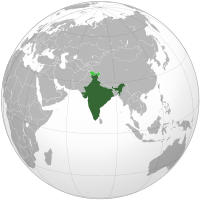
Photo from wikipedia
INTRODUCTION Contemporary research into non-vaccination has highlighted some of the attitudes, beliefs and characteristics of non-vaccinating parents with recent research also beginning to examine the journey to non-vaccination. However, the… Click to show full abstract
INTRODUCTION Contemporary research into non-vaccination has highlighted some of the attitudes, beliefs and characteristics of non-vaccinating parents with recent research also beginning to examine the journey to non-vaccination. However, the interaction between gender, identity and non-vaccination is less well understood, as well as the non-vaccination journey for parents in the UK. METHODS Using purposive sampling we recruited mothers who have rejected some or all of their child's routine vaccinations in the last 5-10 years. Semi- structured interviews were conducted by phone in late 2020 and analysed using thematic analysis. RESULTS Ten mothers were interviewed. They differed in socioeconomic, educational, and cultural backgrounds yet all wanted the same thing: to have happy and healthy children, a goal which they saw as their responsibility and within their control and did not include vaccination. Within this shared parenting priority, identities varied considerably. Most mothers strongly rejected the label or identity of 'anti-vaxxer', preferring alternative terms with less negative social connotations. The decision not to vaccinate was predominantly made by mothers, describing a dynamic where mothers (rather than fathers/partners) were clearly responsible for their children's health, but this largely appeared to be internalised as the mother's role. CONCLUSIONS The heterogeneity of mother's identities within the non-vaccination movement and the pressures on mothers to raise children with 'optimum health' explored in this study, suggest that non-vaccination is a largely individual choice which requires nuanced and compassionate engagement to understand the root causes behind this decision.
Journal Title: Child: care, health and development
Year Published: 2022
Link to full text (if available)
Share on Social Media: Sign Up to like & get
recommendations!